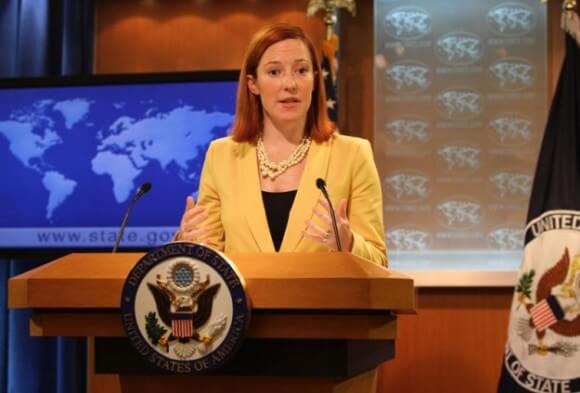
Israel has long sought to enter the U.S. Visa Waiver Program, which allows citizens from participating countries to travel to the United States for up to 90 days without obtaining a visa. Yet, Israel has not been admitted to the program because of its ongoing discrimination against Palestinian and Arab Americans. Under the terms of the program, U.S. citizens are also given the same automatic 90 day visas, a condition of the program known as reciprocity. In a State Department press briefing on Friday, State Department spokesperson Jen Psaki again acknowledged Israel’s pattern of discrimination against U.S. citizens, saying “the Department of Homeland Security and the Department of State both remain concerned for reciprocal visa free travel privileges for U.S. citizens due to the unequal treatment of Palestinian Americans and other Arab Americans receive at Israel’s borders and checkpoints.”
Psaki’s statement came in response to questions from Associated Press reporter Matt Lee concerning a recently announced working group to help ease visa restrictions for Israeli travelers. The State Department indicated that the working group was formed in response to letters from members of Congress, which alleged that the State Department was responding disproportionally to widespread visa fraud related to the Dead Sea industries by denying visas to many young Israelis. On March 6th Senator Charles Schumer sent a letter calling on the State Department to “end its widespread, arbitrary practice of denying young Israelis tourist visas.”
Although lawmakers like Senator Schumer and Representative Grace Meng have remained silent about Israel’s policy of interrogating, detaining and deporting U.S. citizens, they have been vocal in their contention that Israeli travelers suspected of visa fraud should be shown more leniency. In similarly themed remarks during a House Foreign Affairs Committee mark-up of the United States-Israel Strategic Partnership Act, Representative Brad Sherman asserted that Arab Americans who had been denied entry by Israel were “associated with Islamic extremism,” and emphasized the need to ease U.S. visa restrictions so that Israelis could visit Disneyland, saying “when they (Israelis) want to see Mickey Mouse, they should see the real one.”
The recent letters from Senator Schumer and other lawmakers insinuated that the State Department was driving up the denial of Israeli visas in order to trigger a violation of the Visa Waiver Program’s 3% nonimmigrant visa refusal rate requirement, thus thwarting Israel’s entry into program. In other words, members of Congress were accusing the State Department of punitively denying Israeli tourist visas and keeping Israel out of the Visa Waiver Program in order to settle a diplomatic score.
Israeli discrimination against U.S. citizens
By reiterating that Israel was discriminating against U.S. citizens, however, the State Department was clarifying that Israel is not only violating the Visa Waiver Program’s 3% nonimmigrant visa refusal rate, but also the condition that Israel provide U.S. citizens with automatic 90 day visas, known as the reciprocity requirement. During the State Department briefing on Friday, Psaki followed her comments about Israel’s unequal treatment of U.S. citizens by emphasizing that “reciprocity is the most basic condition of the Visa Waiver Program, that hasn’t changed.”
Some U.S. lawmakers have long been aware that Israel’s discrimination against American citizens constitutes a violation of the Visa Waiver Program’s reciprocity requirement and have introduced legislation aimed at facilitating these policies. Legislation proposed by the American Israel Public Affairs Committee (AIPAC) last year, known as the United States-Israel Strategic Partnership Act of 2013 (S. 462, H.R. 938), sought to include Israel in the Visa Waiver Program but exempt it from the reciprocity requirement. When the legislation was initially circulated last year, many members of Congress expressed opposition to including Israel in the Visa Waiver Program, albeit for a number of different reasons. The basis for lawmakers concerns ranged from laudable opposition to Israel’s discriminatory policies to racism against Palestinian citizens of Israel.
Last June, sixteen members of Congress wrote a letter to former Israeli Ambassador Michael Oren expressing concern about Israel’s discrimination against U.S. citizens. The letter read, in part, “we are concerned that Israeli border officials are disproportionally singling out, detaining and denying entry to Arab and Muslim Americans.” The letter also quotes the spokesperson for former Secretary of State Condoleezza Rice, who acknowledged Israel’s discriminatory policy, saying, “we expect all American citizens to be accorded the rights any other American citizen would be accorded…there are no second classes.”
In contrast to the aforementioned concerns, many Republican lawmakers worried that Israel’s entry into the Visa Waiver Program would hinder the United States’ ability to discriminate against Arab citizens of Israel. According to accounts from congressional staffers, a number of the senior republican lawmakers expressed their desire to preserve the United States’ ability to discriminate against Palestinian citizens of Israel. Many of these same lawmakers were also unpleasantly surprised to learn that Arabs comprised such a large percentage of Israel’s population.
The multifaceted opposition to Israel’s entry into the Visa Waiver Program led to a series of heated last minute meetings on Capitol Hill before the introduction of the United States Israel Strategic Partnership Act of 2013. The end result of lawmakers’ meetings was that the reciprocity exemption was taken out of the House bill but remained in the Senate version.
The Israel lobby vs. the U.S. intelligence community
After being delayed for a year, the House version of the bill was brought to a vote in March during AIPAC’s annual policy conference; it passed overwhelmingly. The Senate version of the legislation has yet to be referred out of committee and Senator Boxer has announced plans to rewrite the legislation and remove the problematic exemptions from the Visa Waiver Program’s reciprocity requirement.
Representative Sherman, a major proponent of Israel’s entry into the Visa Waiver Program, has expressed his intention to reinsert the reciprocity exemption into the final piece of legislation when the House and Senate versions are reconciled in conference committee.
The AIPAC backed United States-Israel Strategic Partnership Act may now be facing a new set of hurdles as reports emerge that senior U.S. intelligence officials voiced opposition to Israel’s entry into the Visa Waiver Program, citing fears that Israeli spies will use the program to gain entry to the United States. According to a report by Roll Call, intelligence officials from a number of different agencies made their views known during a classified briefing before the House Judiciary Committee. In recent years, current and former intelligence officials have also made it known that the “CIA considers Israel its No. 1 counterintelligence threat in the agency’s Near East Division, the group that oversees spying across the Middle East.”
Israel denies and justifies discrimination
For their part, Israeli officials have offered contradictory explanations about the treatment of U.S. citizens. When members of Congress sent a letter expressing concern last June, former Israeli Ambassador Michael Oren denied that any such discrimination existed and maintained that only 142 Americans had been denied entry in the last year. More recently, Israeli government officials claimed that it was allowed to treat Palestinian Americans differently under the terms of the Oslo Accords.
According to a report in Haaretz, senior Israeli officials recently said their government would be willing to end discrimination against Palestinian-Americans if Israel is granted entry into the Visa Waiver Program. Given that Israel is already to required to provide U.S. citizens with equal treatment under the 1951 U.S.-Israel Treaty of Friendship, Commerce and Navigation, the proposal by Israeli officials is essentially an offer to sell the United States the same car twice.
In response to questions about Israel’s justification of its policies and what actions the United States is taking to address Israel’s discrimination against U.S. citizens, a State Department spokesperson said “The U.S. government seeks equal treatment and freedom to travel for all U.S. citizens regardless of national origin or ethnicity. We regularly raise this issue with the Government of Israel.”
Although the State Department’s efforts to raise the issue with Israel are a positive development, these measures have so far failed to compel Israel to end its discriminatory policies. Simply expressing concern about Israel’s policies appears to be a wholly insufficient response considering that the United States provides $3.1 billion in taxpayer funded weapons each year and continues to expend political capital at the UN to defend Israeli policies that violate U.S. and international law.
In reality, the only serious challenge to Israel’s discriminatory policies has been the Palestinian-led boycott, divestment and sanctions movement, a source of pressure the State Department has consistently sought to malign. The BDS movement has gained steam in recent years partly as a reaction to the unwillingness of the United States to apply real pressure on Israel to change its policies. Ending Israel’s systemic discrimination will likely take more than perfunctory expressions of concern and private working groups, it will require robust enforcement of U.S. laws designed to protect basic human rights.



So this is the justification? Israelis come to the US to boost our tourism? Sure – pull the other one, it has bells on it.
These treasonous congress-critters need to be removed from their posts. They are pushing the visa waiver program to make it easier for Israeli spies to enter this country without having to undergo any scrutiny from the State Department.
Schumer, Sherman, et alia, should all be forced to resign.
On the plus side, I am thrilled that there are actually some good guys in the State Department! Who would’ve thunk it? Since when did we start ignoring our Intelligence community??
Of course, most Israeli spies already have two passports, so locking the barn door now may not help much.
“many Republican lawmakers worried that Israel’s entry into the Visa Waiver Program would hinder the United States’ ability to discriminate against Arab citizens of Israel”
Infuriating, but it should not surprise. Phil often mentions “Jim Crow”, and always in the past tense. But Jim Crow is coming back strong…
http://www.theatlantic.com/features/archive/2014/04/segregation-now/359813/?google_editors_picks=true
“Although lawmakers like Senator Schumer and Representative Grace Meng have remained silent about Israel’s policy of interrogating, detaining and deporting U.S. citizens, they have been vocal in their contention that Israeli travelers suspected of visa fraud should be shown more leniency.”
Of course. These politicians are just trying to protect the people they’ve been sent to Washington to represent. Too bad the people whose interest they’re representing aren’t Americans.
A few years ago, my Palestinian father, US citizen for 20 years, professor at an Ivy League university, and probably most peaceful man on earth, tried to enter Israel to, among other things, visit his 90 something year old mother in the West Bank. After interrogating him for 3 days and nights, strip searching him, and keeping him in a cell, they sent him back to the US. I am afraid to try to visit my extended family in the West Bank (almost everyone on my father’s side, including his 9 siblings and their children), because of this (among other stories). All I have to add to this discussion is my personal experience, but based on that it infuriates me that Israel could be considered for entry into the visa waiver program and that what our lawmakers are concerned about regarding this issue is Israelis being able to see the real mickey mouse more easily
Here we go again. Special treatment, not equal treatment. Israel uses as its reason not to reciprocate a visa waiver for American citizens, its security issues. Tough sh**t, Israel. Your security issues are your problem, I couldn’t care less about them. If, and when, you solve your ‘security’ issues then you can be considered for the US visa waiver program.